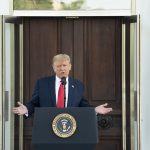Zelenskyy continues his strange tango with American taxpayers, amidst a foreign policy shift that many claim is long overdue. The ongoing saga has seen the Ukrainian president indulge in a little social media melodrama, claiming that Donald Trump lives in a “disinformation space.” This, of course, comes as Zelenskyy enjoys a cozy relationship with U.S. funds, having already pocketed billions in support for a war that seems to have no end in sight. The idea that a leader who has yet to hold new elections is critiquing Trump’s credibility can generate some hefty chuckles—an ungrateful dictator essentially calling the kettle black.
Ukranian President Volodymyr Zelenskyy says Donald Trump 'lives in a place of disinformation'.https://t.co/I2ge3iUDfI
📺 Sky 501, Virgin 602, Freeview 233 and YouTube pic.twitter.com/I0WkkFSDmJ
— Sky News (@SkyNews) February 19, 2025
In typical Trump fashion, the former president has thrown some numbers into the debate, suggesting Zelenskyy’s approval rating hovers around the unbelievable figure of 4 percent. Was this an exaggeration? Perhaps. But what’s apparent is that Trump’s statements are often sprinkled with a degree of truth that lays the groundwork for broader discussions. Trump pointed out the distinct lack of democratic processes in Ukraine while the American media were busy touting the country’s democratic ideals. The irony is almost palpable. After three years of the Biden administration lecturing Americans on democracy in Ukraine, now the Russians are the ones asking for elections to be held. It’s almost as if comedy writers took over state affairs in Washington.
When pressed about whether the Ukrainians really want their leader’s backstory laid bare, Trump cut through the fluff by noting the dire situation on the ground in Ukraine. While Vladimir Putin could hypothetically wreak havoc on Kyiv, the lack of recent elections continues to hang over Zelenskyy like a dark cloud. Even as Zelenskyy was busy deflecting Trump’s criticisms to blame Russia for spreading “false information,” he conveniently avoided addressing the need for elections that would provide some legitimacy to his governance.
Americans are quite tired of what seems like an endless pocketbook promise to Ukraine. Trump is calling for some common sense when it comes to foreign assistance, suggesting that any future U.S. aid could hinge on Ukrainian accountability for previous funding. Whether Zelenskyy takes that call is up in the air, but many would say the situation is ripe for a more balanced dialogue rather than a blind rush toward future funding.
Bringing those historical comparisons into the mix, it is worth remembering how America played a pivotal role in liberating Europe from oppression. The real question is whether it’s time to let Europeans handle their own affairs—just as America did by intervening only when absolutely necessary. Trump is signaling a clear preference to draw back from continued involvement in Ukraine’s conflicts, leaving European powers to navigate their own destinies. This might include new challenges to face, perhaps even a rising Germany that could sport different shades than the past. What stands firm, however, is the notion that America’s lengthy engagement in foreign conflicts should come to an end, especially when the requests for aid come with a heavy dose of ingratitude. Zelenskyy’s antics may just help propel a much-needed policy shift that could benefit American interests and taxpayers alike.




